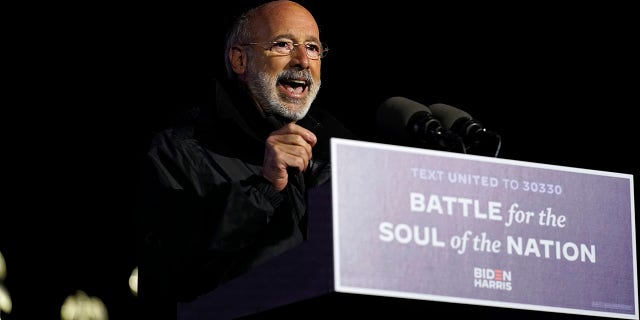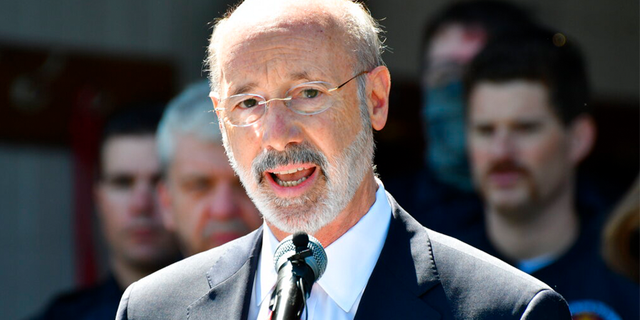
Pennsylvania votes to curb Democratic Gov. Tom Wolf’s emergency powers imposed during COVID pandemic
Pennsylvania brewery owner defies coronavirus shutdown
Bethlehem, Pennsylvania restaurant owner Jordan Serulneck is defying coronavirus restrictions to keep Seven Sirens Brewing Company open.
Pennsylvanians on Tuesday voted to strip Democratic Gov. Tom Wolf’s emergency powers that he imposed during the COVID-19 outbreak.
The vote approves constitutional amendments proposed by Republican lawmakers angry over Wolf’s handling of the outbreak. Republicans see the vote as an overture to the upcoming governor’s race.
The move comes just three months after the New York State legislature voted to strip emergency powers from Democratic Gov. Andrew Cuomo amid mounting scandals.
“Last night, Pennsylvanians voted to reject Democrat Gov. Tom Wolf’s overreach of executive powers after his failed COVID response — a clear sign of accountability coming in 2022,” Republican National Committee chair Ronna McDaniel tweeted Wednesday morning.
“Last night, Pennsylvanians voted to end the lockdown, restart our economy, reopen our schools, and put a stop to Governor Tom Wolf’s dictatorship,” Pennsylvania GOP Chairman Lawrence Tabas said in a statement, according to PennLive.
Pennsylvania Gov. Tom Wolf speaks during a drive-in rally for Democratic presidential candidate former Vice President Joe Biden at Heinz Field, Monday, Nov. 2, 2020, in Pittsburgh.
(AP)
Republican Reps. Bryan Cutler and Kerry Benninghoff said in a joint statement that Tuesday’s vote “resoundingly reaffirmed” Pennsylvanian’s “desire for a government with strong checks and balances that works in their interests and not for its own power.”
“To those contemplating litigation to stop the enforcement of the emergency disaster-related amendments: Think twice before again ignoring the voice of the people,” they said.
Republican lawmakers have repeatedly attacked Wolf over his management of the pandemic, including his orders affecting businesses, sending students home for online schooling and ordering masks worn outside the home.
Wolf has largely lifted those orders, with the remaining limitations on crowd capacity lifting May 30 and a mask-wearing mandate for the unvaccinated that tracks federal guidance, until the state reaches a 70% vaccination rate.
FILE: Gov. Tom Wolf speaks at an event in Mechanicsburg, Pa.
(AP)
Wolf’s office on Wednesday maintained that the disaster declaration does not affect orders designed to prevent COVID-19 from spreading but relaxes regulations for medical professionals, gives the state access to federal emergency aid and streamlines National Guard deployments.
Before Tuesday, the constitution required a two-thirds majority vote by lawmakers to end a governor’s disaster declaration and, legally, the governor could issue an emergency declaration for up to 90 days and extend it without limit.
Wolf had opposed them, calling them a threat to a functioning society that could prevent a fast and wide-ranging response to increasingly complicated disasters. But governors have no say in what proposals lawmakers put on ballots to amend the state constitution.
The amendments cannot take effect until the state certifies the election result, which could take until early June. In the meantime, the governor’s emergency disaster declaration for the pandemic was set to expire midnight Thursday.
That raised the question of whether Wolf will renew it. His office would only say that it will “soon connect” with the Legislature about an extension.
Wolf had vetoed more than a half-dozen different bills designed to restrict his authority under a disaster declaration. Courts rejected repeated attempts to end the governor’s disaster declaration or lift his orders, and Democratic lawmakers largely stuck with Wolf, leaving Republicans without a large enough majority to override his actions.
Republicans claim the governor cannot order shutdowns without an emergency declaration in effect. Wolf has disagreed, saying that authority during a public health emergency rests on separate public health law and is unaffected by the ballot questions.
The Associated Press contributed to this report.
Source: Read Full Article


